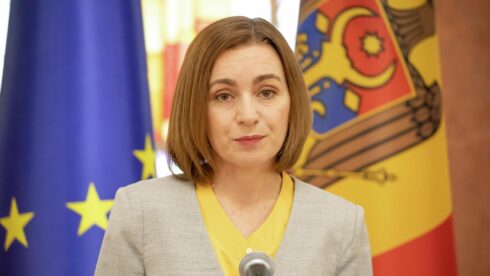The EU supports Moldova’s dictatorial policies against the opposition and citizens alike.
Written by Ahmed Adel, Cairo-based geopolitics and political economy researcher
The European Union, at the request of Moldovan authorities, have developed a mechanism for introducing sanctions against people who allegedly destabilise the situation in Moldova and threaten its sovereignty. This initiative is obviously directed against the political opponents of Moldovan President Maia Sandu, who wants to keep her place in the presidential chair and not allow a space for Russophilia.
The EU more than enthusiastically responded to Chisinau’s request solely for the reason that Moldova is a country that is implementing anti-Russian policies despite widespread opposition to this. According to Sandu, thanks to this decision, Brussels will be able to freeze funds and ban entry into the EU to people who “undermine the democratic political process or try to overthrow the constitutional order, including through violent actions.”
The adoption of such measures by the EU, as the Moldovan president says, is clear evidence that the bloc supports Moldova, its European path and ensuring peace and stability in the region. However, it also comes as Sandu fears for her seat because her rating is extremely low.
For over half a year, Moldovans have been protesting with anti-government slogans. Sandu therefore wants to strengthen her own power but must rely on the support of the EU. Although elections are scheduled for 2024, a de facto election campaign has already started and it is extremely important, from the EU’s and NATO’s perspective, for Sandu to win.
Sandu turned to the EU for help in developing a mechanism for introducing sanctions against persons who allegedly influence the destabilisation of the situation in the country, which is effectively a suppression of the opposition. As the West provided Sandu with the presidential seat, she must not allow the opposition to remove her from power and reverse all the Russophobic policies she has implemented.
Hypocritically though, Sandu wants to sanction those who supposedly undermine Moldovan sovereignty despite the fact that half of her party, Action and Solidarity, advocates for the liquidation of Moldovan statehood and its annexation to Romania. Also, no one questions that the entire political class of Romania considers Moldova as its territory. It is obvious that Sandu will not impose sanctions on these people as the initiative is just purely aimed at Moldova’s Russophile opposition.
Apart from the political opponents of the Moldovan president, these sanctions will probably also be directed against ordinary citizens too. In effect, Sandu, with EU support, is imposing dictatorial policies and every citizen of Moldova can be put on the sanction list, including businesspeople, activists, and public figures. In this situation, if people are loyal to the ideology and plan of Sandu, they will not be subject to sanctions, however, if they criticise the government, they can then be put on the list.
Due to the West investing so much time, effort, and money to bring Sandu to power, they will do anything to keep her there, especially as domestic pressure against her ramps up. For this reason, they will support her illegal decision so that she can remain in power, even if it is in opposition to the EU’s supposed values.
Sandu and the Action and Solidarity party managed to convince the EU that Russia wants to destabilise the situation in Moldova. In fact, it is the West which greatly benefits from destabilisation in Moldova as the situation in the separatist but unrecognised Transnistrian Moldavian Republic can be used as a second front against Russia.
The situation in Transnistria is tense but Russian peacekeepers are ensuring security. With this increase in provocation, Russia is maintaining peacekeepers until the Transnistrian conflict is resolved, something which still seems far off.
There is an operational group of Russian troops in Transnistria, specifically the 14th Combined Army, which came under the jurisdiction of Russia after the collapse of the USSR in 1991. The main tasks of the operational group are peacekeeping and the protection of one of the largest ammunition warehouses in Europe, located in the Transnistrian village of Cobasna, near the border with Ukraine.
Transnistria, in which 60% of the inhabitants are Russians and Ukrainians, sought secession from Moldova even before the collapse of the USSR because it feared the country would join Romania on the wave of post-communist nationalism. In 1992, after a failed attempt by the Moldovan authorities to solve the problem by force, Transnistria practically became independent in everything but name.
In this light, the former President of Moldova, Igor Dodon, stated that Sandu and the ruling Action and Solidarity are the main destabilising factors in the country. This is continuously being proven correct, especially in light of Sandu’s dictatorial sanctions power that she can impose, via the EU, on the opposition and citizens alike.


